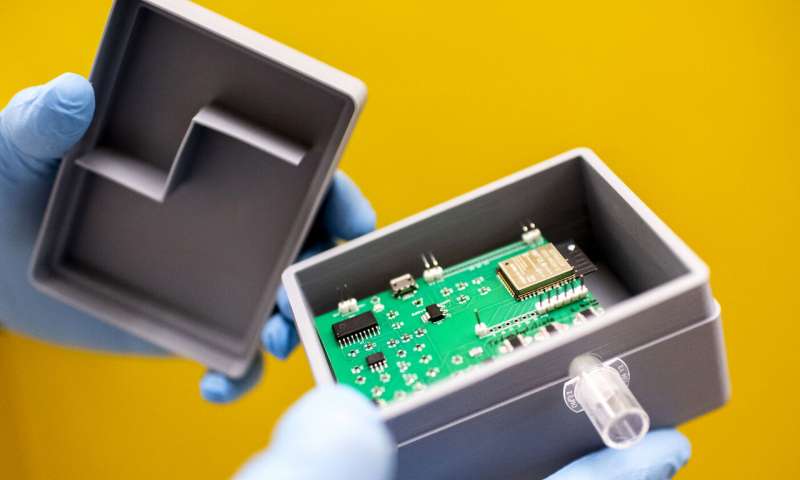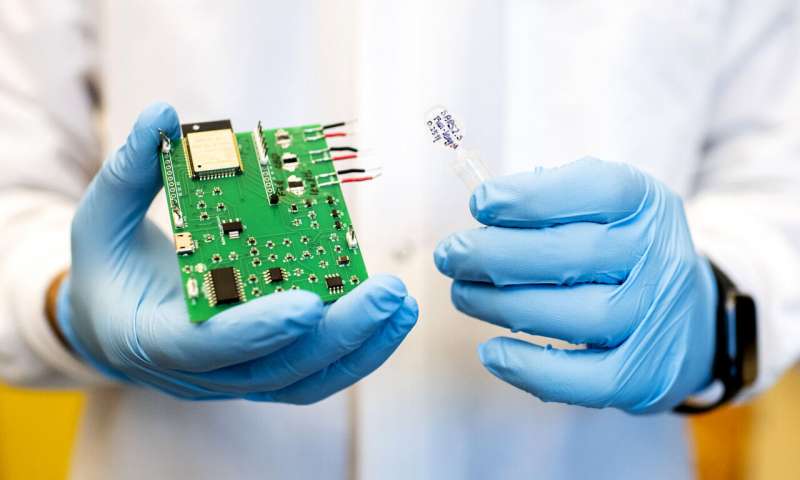BREAKING! Healthcare Innovations: Northeastern University-Boston Develops Sensor That Can Detect SARS-CoV-2 Coronavirus Particles In The Air
Source: Healthcare Innovations Jul 20, 2020 5 years, 6 months, 2 weeks, 1 day, 10 hours, 55 minutes ago
Healthcare Innovations: Researchers from Northeastern University-Boston have created a new sensor that is capable of detecting the SARS-CoV-2 coronavirus particle in the air. The new sensor would be a major game changer in the management of the current COVID-19 pandemic.
 A gas sensor used to detect airborne SARS-CoV-2 virus in Professor Nian Sun’s lab in Egan
A gas sensor used to detect airborne SARS-CoV-2 virus in Professor Nian Sun’s lab in Egan
Research Center. Credit: Ruby Wallau-Northeastern University
As businesses, schools and other organizations plan their strategies to reopen during the COVID-19 pandemic, testing people regularly for the coronavirus will be one of the key components in attempts to slow and control new waves of cases.
However current testing technologies can be slow….in fact too slow….for the rapid spread of the virus. A positive test today doesn't necessarily mean someone is still free of the virus two days later, which is about as long as the test results would take to be delivered if you are in America.
Hence if there is technology that can perform instant and frequent testing, it could serve as an important weapon in the fight against a pandemic that has already taken a significant toll on people, markets, and governments around the world.
Fortunately it is precisely the technology that Dr Nian Sun, a professor of electrical and computer engineering at Northeastern University, is working on.
 A gas sensor used to detect airborne SARS-CoV-2 virus in Professor Nian Sun’s lab in Egan
A gas sensor used to detect airborne SARS-CoV-2 virus in Professor Nian Sun’s lab in Egan
Research Center. Credit: Ruby Wallau-Northeastern University
Dr Sun created a gas sensor for different molecules in the air. It's a device that can probe the chemistry of airborne pathogens, including the SARS-CoV-2 coronavirus, which causes COVID-19. And, like a breathalyzer that can give results in real-time, it works within seconds.
The sensor device uses electrochemical sensors consisting of a special material imprinted with cavities that are the same shape and size as the crown-like structure of proteins that cover the SARS-CoV-2 virus.
Similar to missing pieces from a puzzle, those proteins (and only those proteins) fit within the cavities of the material. The sensors basically catch those particles from the air. Then, the material reacts with the proteins and sends an electrical signal indicating that the virus is present.
Dr Sun told Thailand Medical News, "When this matter is in the air, it can be very contagious, and land on the environment, like on top of the desk, on a toilet, on door handles on everything. We use our sensors to detect those viruses that are in the air or on a surface."
As the microscopic imprints on the sensors are the same exact shape as the coronavirus spike proteins, the device provides high sensitivity and accuracy, Dr Sun says.
In D
r Sun’s lab, the sensors have shown to be as effective at detecting the coronavirus as the gold standard in current testing, using polymerase chain reactions. The process for that kind of testing involves making millions of copies of the genetic material to detect the coronavirus. But it can take days and highly specialized laboratories to conduct.
Because of the logistical limitations of needing to swab people's nostrils and waiting for those samples to be shipped for analysis, handheld devices that can accurately analyze exhaled breath instantly could be a game changer, Dr Sun says.
Dr Sun added. "This is technology that can dramatically change the landscape of COVID-19 testing because it is easily two orders of magnitude faster than the best technology nowadays. In reopening businesses, schools, universities, essentially, it is life-saving technology."
Dr Sun originally began working on gas-sensing technology to help find illegal drugs and explosives, a job often left to dogs with specialized training.
Dr Sun explained, "Those are trained sniffer dogs, and they can do the job by just simply smelling. So I thought, 'why can't we engineers design something like an electronic sensor that can beat that?'"
In recent years, Dr Sun and his colleagues have been working on other devices to sense airborne molecules and use them as biomarkers to screen for medical conditions such as Alzheimer's disease and lung cancer.
Initially when the pandemic hit, he saw a new use for his technology. The team recently secured funding from the National Science Foundation to improve the sensors and make them available to clinicians to test for the coronavirus.
Along with Dr Jeremy Luban, a Professor at the University of Massachusetts Medical School, Sun is working with the medical community to test his device, and get emergency authorization from the U.S. Food and Drug Administration to use it in different settings.
Dr Sun says he envisions his gadget as a handheld tool used in hospitals, schools, and other types of environments where people can be at risk of inhaling viral particles indoors.
Also, because the molecularly imprinted sensors could also be mounted on surfaces, Dr Sun says the device could also help with more efficient testing for viral particles that fall from the air and onto different objects.
Dr Sun commented, "We can easily sense the surface by just laying the sensor directly on it. We just put a sensor right there, and it can give us a result automatically, remotely, wirelessly."
For the latest
Healthcare Innovations, keep on logging to Thailand Medical news.

